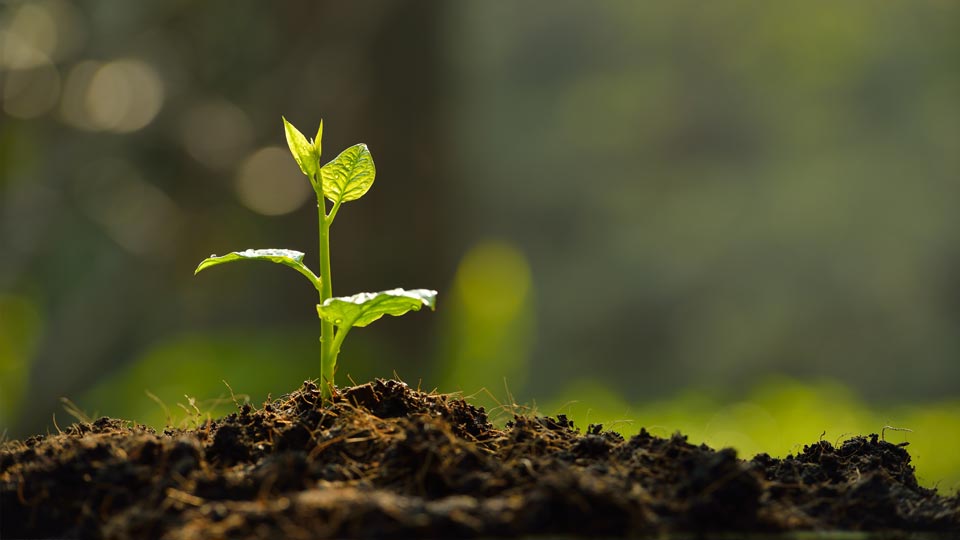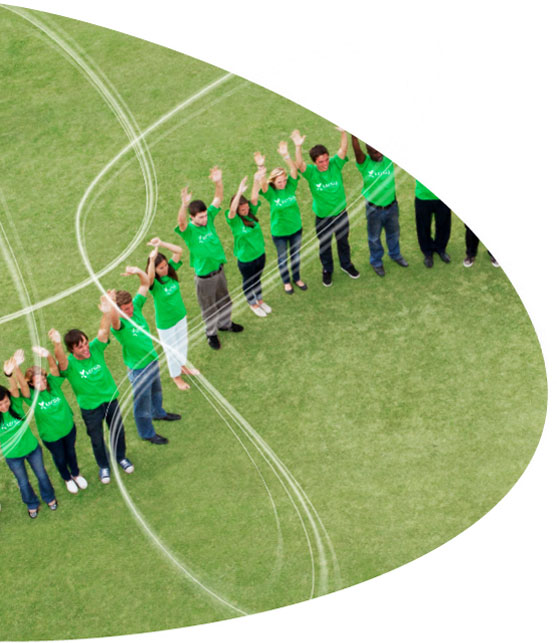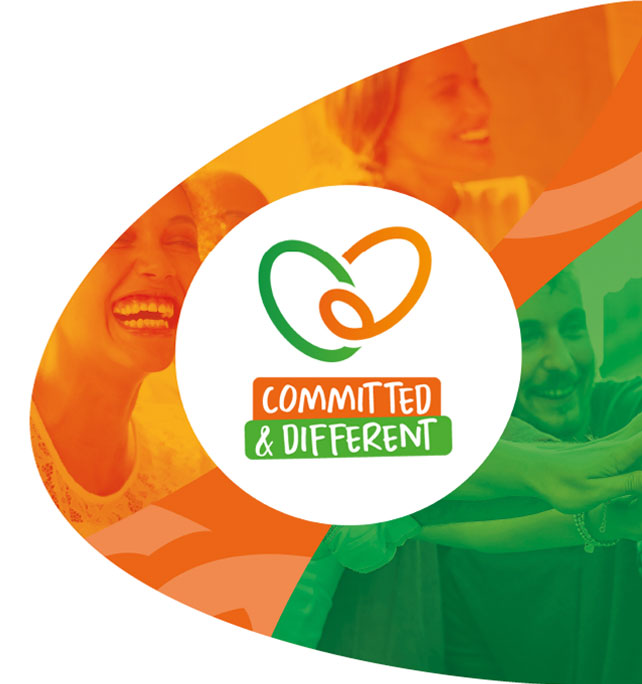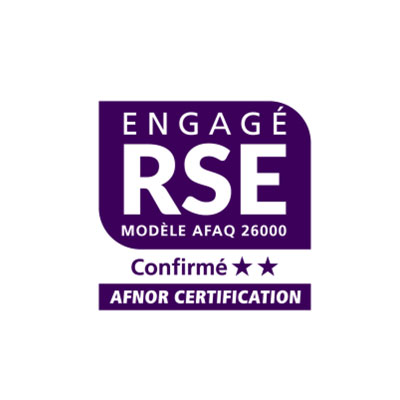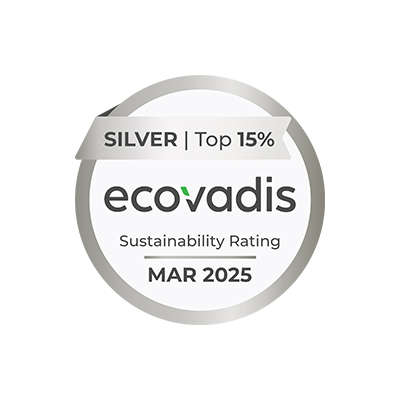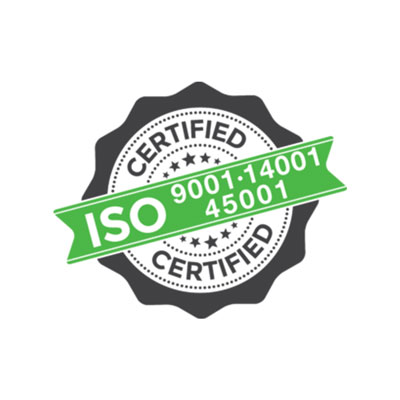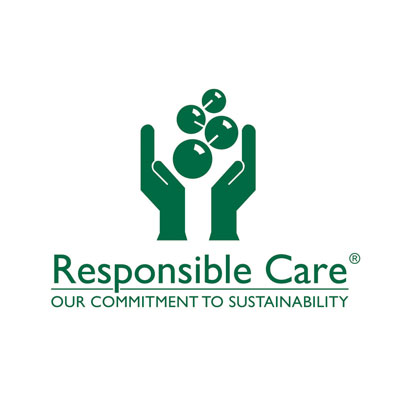At Kersia, we manufacture and distribute a range of solutions to prevent contamination in animals, food and humans, with food safety being our core competency.
We are aware that our products impact the planet and living beings, which is why in 2016 we committed to sustainable development by creating our “ACT for a positive impact” programme.
This corporate social responsibility (CSR) programme, reflects the Group’s four values: transparency, sharing, proficiency and foresight. It enables our employees to play an active part in providing increasingly conscious and quality solutions to our customers. All our stakeholders – customers, suppliers, the authorities, local communities and shareholders – are involved in contributing to a better world, together. (two-way interaction)
Recognition
Proud of our progress towards an increasingly sustainable group, we are committed to ensuring that the commitment of our employees is recognised, while enabling continuous improvement in our social and environmental performance. That’s why we chose to be assessed by AFNOR with the Engagés RSE label (based on the ISO 26000 standard), for which we were awarded level 3 out of 4, and by Ecovadis, which awarded us the silver medal.
In order to guarantee and improve customer satisfaction, reduce our environmental impact, adapt to climate change and provide ever safer and healthier working conditions for our employees, we are aiming to obtain triple ISO 9001, ISO 14001 and ISO 45001 certification for all our facilities worldwide. In France, our Hypred, Hypred Distribution and LCB Food Safety sites and activities have already been triple-certified for several years.
In 2024, the Group officially validated its decarbonisation trajectory with the Science-Based Target initiative (SBTi). Kersia is committed to reducing absolute GHG emissions from scopes 1 and 2 by 42% by 2030, compared with the baseline year of 2023. Kersia is also committed to reducing Scope 3 GHG emissions from purchased goods and services, upstream transport and distribution, waste generated by operations, business travel and end-of-life treatment of products sold by 51.6% per million euros of value added, within the same timeframe.
CSR challenges
An action plan in line with the United Nations goals for 2030
In September 2015, an historic summit of the United Nations saw the adoption of 17 sustainable development goals for 2030, to put an end to all forms of poverty, fight inequality and tackle climate change. In light of Kersia’s mission, 9 of these goals are now key challenges for the group.

2.4 By 2030, ensure sustainable food production systems and implement resilient agricultural practices that increase productivity and production, that help maintain ecosystems, that strengthen capacity for adaptation to climate change, extreme weather, drought, flooding and other disasters and that progressively improve land and soil quality.
ACT FOR POSITIVE IMPACT
COMPLIANCE
HUMAN CAPITAL
ENVIRONMENT
POSITIVE IMPACT: Promote products garanteeing positive impact beyond regulatory compliance
CUSTOMER RELATIONSHIP
DISRUPTIVE INNOVATION: Deploy projects linked to FOOD SAFETY from farm to fork using biotechnology
RESPONSIBLE BEHAVIOUR
TERRITORIAL IMPACT

3.D Strengthen the capacity of all countries, in particular developing countries, for early warning, risk reduction and management of national and global health risks
ACT FOR POSITIVE IMPACT
COMPLIANCE
HUMAN CAPITAL
IDAY: collect regularly requests of our employees in order to deploy new projects according to their proposals
SAFETY: prevent accidents and implement safety certification for all our installations
WELL BEING: implement a global action plan to prevent psychosocial risks
ENVIRONMENT
BALANCE BETWEEN PERSONNAL AND PROFESSIONNAL LIFE: implement tools to measure respect of the balance
CUSTOMER RELATIONSHIP
SAFETY & PERFORMANCE TRAINING: deploy complete programms of training for our customers
RESPONSIBLE BEHAVIOUR
GREEN CHEMISTRY: Deploy Disruptive innovation projects linked to limitation of risks and residus
TERRITORIAL IMPACT

4.4 By 2030, substantially increase the number of youth and adults who have relevant skills, including technical and vocational skills, for employment, decent jobs and entrepreneurship
4.5 By 2030, eliminate gender disparities in education and ensure equal access to all levels of education and vocational training for the vulnerable, including persons with disabilities, indigenous peoples and children in vulnerable situations
ACT FOR POSITIVE IMPACT
COMPLIANCE
HUMAN CAPITAL
YOUNG AND VULNERABLE PEOPLE: implement specific procedures and programms to guarantee they are fully protected
GLOBAL TRAINING ACTION PLAN: implement and measure the performance of any training programms
ENVIRONMENT
BIODIVERSITY: implement global session of sensitization for all employees
CUSTOMER RELATIONSHIP
RESPONSIBLE BEHAVIOUR
TERRITORIAL IMPACT
LOCAL COMMITMENT to enhance employment and education
WATER: deploy existing models to supply treatment of water in African’s school

6.3 By 2030, improve water quality by reducing pollution, eliminating dumping and minimizing release of hazardous chemicals and materials, halving the proportion of untreated wastewater and substantially increasing recycling and safe reuse globally
ACT FOR POSITIVE IMPACT
COMPLIANCE
HUMAN CAPITAL
ENVIRONMENT
WATER: communicate on existing models within the group to recycle water of our installations and deploy the models
CUSTOMER RELATIONSHIP
Reduction of clients WATER footprint
RESPONSIBLE BEHAVIOUR
WATER: deploy existing models to supply treatment of water
TERRITORIAL IMPACT

8.5 By 2030, achieve full and productive employment and decent work for all women and men, including for young people and persons with disabilities, and equal pay for work of equal value
8.8 Protect labour rights and promote safe and secure working environments for all workers, including migrant workers, in particular women migrants, and those in precarious employment
ACT FOR POSITIVE IMPACT
COMPLIANCE
CODE OF ETHICS: implement anti-corruption practices
HUMAN CAPITAL
HR POLICY: job creation, social & working conditions, professionnal equity, integration of disable people and values sharing
SOCIAL DIALOG: implementat global and local structure to favor social dialog
ENVIRONMENT
HSE POLICY: share good practices and evaluate performance
CUSTOMER RELATIONSHIP
RESPONSIBLE BEHAVIOUR
CODE OF ETHICS: human rights, anti-discrimination practices
TERRITORIAL IMPACT
CODE OF ETHICS: responsible purchasing favouring local suppliers

9.4 By 2030, upgrade infrastructure and retrofit industries to make them sustainable, with increased resource-use efficiency and greater adoption of clean and environmentally sound technologies and industrial processes, with all countries taking action in accordance with their respective capabilities
ACT FOR POSITIVE IMPACT
COMPLIANCE
IT CHARTER: share good practices and protection of personnal data
HUMAN CAPITAL
ENVIRONMENT
Reduction of ENERGY footprint of our supply chain through the implementation of optimization programms
CUSTOMER RELATIONSHIP
TRIPLE CERTIFICATION for all our installations before 2024 (ISO 9001, ISO 14001, OSHAS 18001/ ISO 45001)
CRISIS MANAGEMENT PROCEDURE: define clear procedure for any sort of crisis
CRM deployment: follow support of customers in a unique tool
RESPONSIBLE BEHAVIOUR
Switch from linear to CIRCULAR ECONOMY for any new investments
TERRITORIAL IMPACT

12.4 By 2020, achieve the environmentally sound management of chemicals and all wastes throughout their life cycle, in accordance with agreed international frameworks, and significantly reduce their release to air, water and soil in order to minimize their adverse impacts on human health and the environment
12.5 By 2030, substantially reduce waste generation through prevention, reduction, recycling and reuse
12.6 Encourage companies, especially large and transnational companies, to adopt sustainable practices and to integrate sustainability information into their reporting cycle
ACT FOR POSITIVE IMPACT
COMPLIANCE
EXTRA FINANCIAL REPORTING: implement a platform to follow extra financial performance
HUMAN CAPITAL
PERSONNAL DATA PROTECTION: implement Group’s procedure to guarantee protection of personnal data
ENVIRONMENT
PLASTIC: communicate on existing models within the group for collecting and recycling of packaging and deploy the models
WASTE MANAGEMENT: switch from linear to CIRCULAR ECONOMY for any new project and evaluate performance
CUSTOMER RELATIONSHIP
CUSTOMER’s SATISFACTION: implement global campaigns to gather satisfactory level of our customers
SUPPLIER CHARTER: guaranteing our customers we are controlling all our supply chain
RESPONSIBLE BEHAVIOUR
ETHICAL CODE: deploy responsible behaviour
CARTOGRAPHY OF RISKS: list of any risks for the group and implement action plans to limit them
TERRITORIAL IMPACT
LOCAL COMMUNITY: deploy action plans around all our installations (co-working, co driving, …)

13.1 Strengthen resilience and adaptive capacity to climate-related hazards and natural disasters in all countries
ACT FOR POSITIVE IMPACT
COMPLIANCE
HUMAN CAPITAL
ENVIRONMENT
Cartography of climate risks: list all applicable risks and implement continuity plans
Cars: deploy Hybrid and electric cars
CarbonFootprint: reduction along supply chain through optimization programm
Renewable Energy: deploy the percentage of renewable energy used in our installations
CUSTOMER RELATIONSHIP
RESPONSIBLE BEHAVIOUR
TERRITORIAL IMPACT

17.16 Enhance the global partnership for sustainable development, complemented by multi-stakeholder partnerships that mobilize and share knowledge, expertise, technology and financial resources, to support the achievement of the sustainable development goals in all countries, in particular developing countries
ACT FOR POSITIVE IMPACT
COMPLIANCE
REGULATORY SURVEY: deploy a common global tool to survey and better anticipate any new regulations
HUMAN CAPITAL
ASHOKA programm: support employee to change mindsets
ENVIRONMENT
CUSTOMER RELATIONSHIP
ECOVADIS COMITMENT: extend the evaluation to KERSIA GROUP
RESPONSIBLE BEHAVIOUR
PROFESSIONNAL ASSOCIATIONS: contribute to professionnal associations in all strategic country
ASHOKA programm: support people who are using their entreprenarial competencies to solve a social problem linked to FOOD SAFETY on a large scale
TERRITORIAL IMPACT
DISABLE PEOPLE: implement Partnerships with any technical centers employing disable people around our installations
LOCAL PROJECTS: participate to any relevant local projects
- 2. ZERO HUNGER
-

2.4 By 2030, ensure sustainable food production systems and implement resilient agricultural practices that increase productivity and production, that help maintain ecosystems, that strengthen capacity for adaptation to climate change, extreme weather, drought, flooding and other disasters and that progressively improve land and soil quality.
ACT FOR POSITIVE IMPACT
COMPLIANCE
HUMAN CAPITAL
ENVIRONMENT
POSITIVE IMPACT: Promote products garanteeing positive impact beyond regulatory compliance
CUSTOMER RELATIONSHIP
DISRUPTIVE INNOVATION: Deploy projects linked to FOOD SAFETY from farm to fork using biotechnology
RESPONSIBLE BEHAVIOUR
TERRITORIAL IMPACT
- 3. GOOD HEALTH AND WELL-BEING
-

3.D Strengthen the capacity of all countries, in particular developing countries, for early warning, risk reduction and management of national and global health risks
ACT FOR POSITIVE IMPACT
COMPLIANCE
HUMAN CAPITAL
IDAY: collect regularly requests of our employees in order to deploy new projects according to their proposals
SAFETY: prevent accidents and implement safety certification for all our installations
WELL BEING: implement a global action plan to prevent psychosocial risks
ENVIRONMENT
BALANCE BETWEEN PERSONNAL AND PROFESSIONNAL LIFE: implement tools to measure respect of the balance
CUSTOMER RELATIONSHIP
SAFETY & PERFORMANCE TRAINING: deploy complete programms of training for our customers
RESPONSIBLE BEHAVIOUR
GREEN CHEMISTRY: Deploy Disruptive innovation projects linked to limitation of risks and residus
TERRITORIAL IMPACT
- 4. QUALITY EDUCATION
-

4.4 By 2030, substantially increase the number of youth and adults who have relevant skills, including technical and vocational skills, for employment, decent jobs and entrepreneurship
4.5 By 2030, eliminate gender disparities in education and ensure equal access to all levels of education and vocational training for the vulnerable, including persons with disabilities, indigenous peoples and children in vulnerable situations
ACT FOR POSITIVE IMPACT
COMPLIANCE
HUMAN CAPITAL
YOUNG AND VULNERABLE PEOPLE: implement specific procedures and programms to guarantee they are fully protected
GLOBAL TRAINING ACTION PLAN: implement and measure the performance of any training programms
ENVIRONMENT
BIODIVERSITY: implement global session of sensitization for all employees
CUSTOMER RELATIONSHIP
RESPONSIBLE BEHAVIOUR
TERRITORIAL IMPACT
LOCAL COMMITMENT to enhance employment and education
WATER: deploy existing models to supply treatment of water in African’s school
- 6. CLEAN WATER AND SANITATION
-

6.3 By 2030, improve water quality by reducing pollution, eliminating dumping and minimizing release of hazardous chemicals and materials, halving the proportion of untreated wastewater and substantially increasing recycling and safe reuse globally
ACT FOR POSITIVE IMPACT
COMPLIANCE
HUMAN CAPITAL
ENVIRONMENT
WATER: communicate on existing models within the group to recycle water of our installations and deploy the models
CUSTOMER RELATIONSHIP
Reduction of clients WATER footprint
RESPONSIBLE BEHAVIOUR
WATER: deploy existing models to supply treatment of water
TERRITORIAL IMPACT
- 8. DECENT WORK AND ECONOMIC GROWTH
-

8.5 By 2030, achieve full and productive employment and decent work for all women and men, including for young people and persons with disabilities, and equal pay for work of equal value
8.8 Protect labour rights and promote safe and secure working environments for all workers, including migrant workers, in particular women migrants, and those in precarious employmentACT FOR POSITIVE IMPACT
COMPLIANCE
CODE OF ETHICS: implement anti-corruption practices
HUMAN CAPITAL
HR POLICY: job creation, social & working conditions, professionnal equity, integration of disable people and values sharing
SOCIAL DIALOG: implementat global and local structure to favor social dialog
ENVIRONMENT
HSE POLICY: share good practices and evaluate performance
CUSTOMER RELATIONSHIP
RESPONSIBLE BEHAVIOUR
CODE OF ETHICS: human rights, anti-discrimination practices
TERRITORIAL IMPACT
CODE OF ETHICS: responsible purchasing favouring local suppliers
- 9. INDUSTRY, INNOVATION AND INFRASTRUCTURE
-

9.4 By 2030, upgrade infrastructure and retrofit industries to make them sustainable, with increased resource-use efficiency and greater adoption of clean and environmentally sound technologies and industrial processes, with all countries taking action in accordance with their respective capabilities
ACT FOR POSITIVE IMPACT
COMPLIANCE
IT CHARTER: share good practices and protection of personnal data
HUMAN CAPITAL
ENVIRONMENT
Reduction of ENERGY footprint of our supply chain through the implementation of optimization programms
CUSTOMER RELATIONSHIP
TRIPLE CERTIFICATION for all our installations before 2024 (ISO 9001, ISO 14001, OSHAS 18001/ ISO 45001)
CRISIS MANAGEMENT PROCEDURE: define clear procedure for any sort of crisis
CRM deployment: follow support of customers in a unique tool
RESPONSIBLE BEHAVIOUR
Switch from linear to CIRCULAR ECONOMY for any new investments
TERRITORIAL IMPACT
- 12. RESPONSIBLE CONSUMPTION AND PRODUCTION
-

12.4 By 2020, achieve the environmentally sound management of chemicals and all wastes throughout their life cycle, in accordance with agreed international frameworks, and significantly reduce their release to air, water and soil in order to minimize their adverse impacts on human health and the environment
12.5 By 2030, substantially reduce waste generation through prevention, reduction, recycling and reuse
12.6 Encourage companies, especially large and transnational companies, to adopt sustainable practices and to integrate sustainability information into their reporting cycle
ACT FOR POSITIVE IMPACT
COMPLIANCE
EXTRA FINANCIAL REPORTING: implement a platform to follow extra financial performance
HUMAN CAPITAL
PERSONNAL DATA PROTECTION: implement Group’s procedure to guarantee protection of personnal data
ENVIRONMENT
PLASTIC: communicate on existing models within the group for collecting and recycling of packaging and deploy the models
WASTE MANAGEMENT: switch from linear to CIRCULAR ECONOMY for any new project and evaluate performance
CUSTOMER RELATIONSHIP
CUSTOMER’s SATISFACTION: implement global campaigns to gather satisfactory level of our customers
SUPPLIER CHARTER: guaranteing our customers we are controlling all our supply chain
RESPONSIBLE BEHAVIOUR
ETHICAL CODE: deploy responsible behaviour
CARTOGRAPHY OF RISKS: list of any risks for the group and implement action plans to limit them
TERRITORIAL IMPACT
LOCAL COMMUNITY: deploy action plans around all our installations (co-working, co driving, …)
- 13. CLIMATE ACTION
-

13.1 Strengthen resilience and adaptive capacity to climate-related hazards and natural disasters in all countries
ACT FOR POSITIVE IMPACT
COMPLIANCE
HUMAN CAPITAL
ENVIRONMENT
Cartography of climate risks: list all applicable risks and implement continuity plans
Cars: deploy Hybrid and electric cars
CarbonFootprint: reduction along supply chain through optimization programm
Renewable Energy: deploy the percentage of renewable energy used in our installations
CUSTOMER RELATIONSHIP
RESPONSIBLE BEHAVIOUR
TERRITORIAL IMPACT
- 17. PARTNERSHIPS FOR THE GOALS
-

17.16 Enhance the global partnership for sustainable development, complemented by multi-stakeholder partnerships that mobilize and share knowledge, expertise, technology and financial resources, to support the achievement of the sustainable development goals in all countries, in particular developing countries
ACT FOR POSITIVE IMPACT
COMPLIANCE
REGULATORY SURVEY: deploy a common global tool to survey and better anticipate any new regulations
HUMAN CAPITAL
ASHOKA programm: support employee to change mindsets
ENVIRONMENT
CUSTOMER RELATIONSHIP
ECOVADIS COMITMENT: extend the evaluation to KERSIA GROUP
RESPONSIBLE BEHAVIOUR
PROFESSIONNAL ASSOCIATIONS: contribute to professionnal associations in all strategic country
ASHOKA programm: support people who are using their entreprenarial competencies to solve a social problem linked to FOOD SAFETY on a large scale
TERRITORIAL IMPACT
DISABLE PEOPLE: implement Partnerships with any technical centers employing disable people around our installations
LOCAL PROJECTS: participate to any relevant local projects




